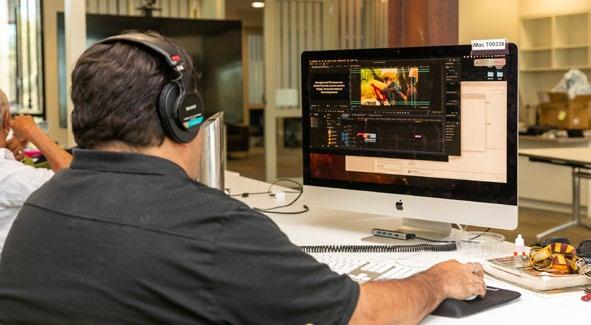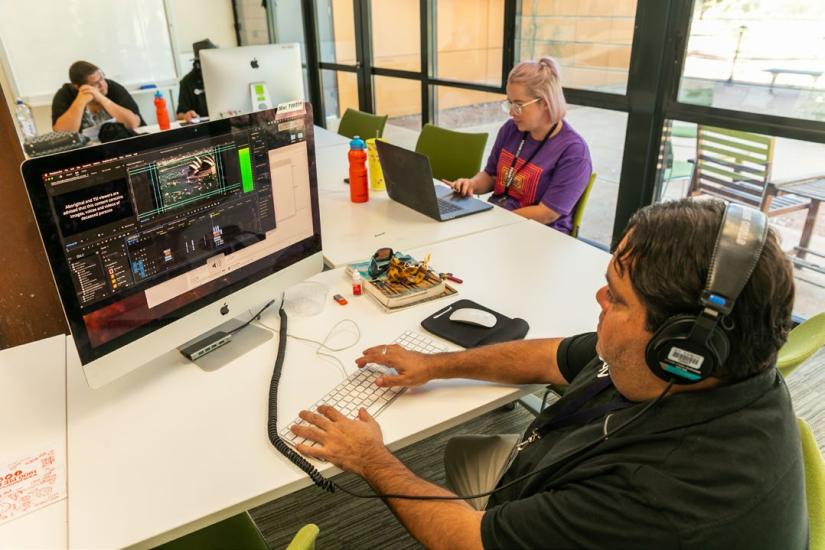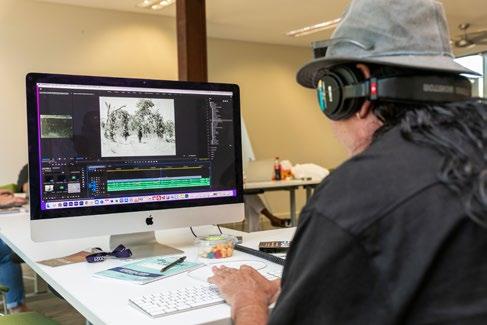
WORKSHOP 4 - Documentary Production Masterclass
Workshop Description
The workshop introduced participants to different genres when producing factual content, in
particular when using archival material. It involved group viewing of documentaries that used
archival material and group discussion, along with insights from the mentors and trainer about
their experiences using and accessing archival material. Cost and licencing issues were also
covered.
Workshop Trainers
- Trainer and Workshop Developer: Industry Associate Professor Pauline Clague
- Mentors: Mitch Torres and Gillian Moody
Proposed Outcomes.
- Understand the different documentary forms including the language around documentary genres.
- Produce a short video according to a documentary genre using archival material.
Participants
Seven participants registered for this workshop including six Indigenous participants and one non-Indigenous participant. Pre-existing editing skills were a pre-requisite.
Skills & Knowledge Outcomes
- Use of archives.
- How to use the catalogue spaces.
- How to research stories.
- Using genres of documentary to establish how to tell a story.
- Placing re-narration on archives to change the lens of a story.
- Legal elements to consider when using archives.
- How to write a synopsis (with template provided).
- How to cut a sizzler reel.
- How to create a new narrative from archives.
Immediate Outcomes
- Synopsis was written for two of the concepts.
- Narrations were written for all video prior to being recorded.
- Five sizzler reels were produced: two were new narratives, one was a straight compilation of archives, and two were sizzler reels of documentary concepts. (Licencing issues mean very little of the material can be broadcast.)
- Videos produced by participants can be viewed here (Case Sensitive Password: FRAIM)
Long-term Outcomes
- Participants to produce content for ICTV using archival content and using a range of different documentary formats.
- Participants empowered to utilise archival content in telling stories.
Post-FRAIM Support
Documentation or web links were provided to all participants.
Having Gillian Moody from the NFSA present allowed open conversations around the differences in funding and legal requirements depending on broadcasters, family, footage links and access points which was useful for maintaining relationships for the work at hand.
The following handouts were provided electronically:
- Material to be licenced template.
- Audience participant release form.
- Performer release form.
- Copyright licence agreement.
- Using archives (including different sites and places to look for archival material).
- Synopsis template.
Key Features
- Two experienced mentors.
- Well-structured workshops.

Workshop Comments
All participants evaluated the workshop as either extremely or very well organised, and either very or extremely helpful.
All felt:
The duration of the workshops was ‘about right’.
What did participants like?
– The workshops for film industry workers to improve their skills and knowledge.
– Great workshops + facilitators, entertaining events and comfortable venues.
– The exposure and interaction with people who have an enormous amount of skills &
knowledge.
– The knowledge of the Trainers (Pauline Clague, Gillian Moody & Mitch Torres) and the information learnt.
– The workshop and meeting people.
– Excellent workshops. Meeting and getting to know other contributors and see their work at the
screenings.
– The mentors were fantastic and the information learnt was incredible.
– Working with great facilitators & colleagues. Useful information & links/networking.
– The ability to use the information provided and time in the workshop to produce something that can be used in the future.
– Opening my mind to writing a script as a class exercise.
– Learning about what archiving really was about and how to get access to archives.
– Three very experienced trainers with lots of professional insights.
What could have been better?
- Would have liked to receive handouts as hard copies.
- Would have liked to receive information on different documentary formats/genres.
Trainer Evaluation & Insights

Time and effort required in getting access to archives through the NFSA meant other avenues for archives including alternative collections were also explored.
The shared experiences of the mentors and trainers in making films provided important information for delegates, particularly the implications of a well-funded film versus a community film budget.
The detailed workshop helped to bring a new understanding to other forms of the participants’ work.
Mapping through the research process on a film would have been useful if time allowed.
Recommendations/Issues
- A great choice of mentors meant participants received valuable one-on-one support.

